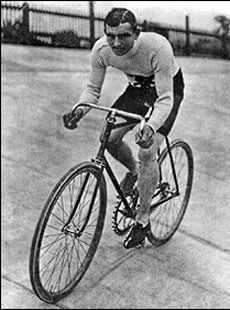|
 In the 1896 edition Welshman Arthur V Linton (seen left) was first to finish - but had gone off course. In the end he was given a dead-heat with Gaston Rivere of France. Arthur rode has a professional for Gladiator Cycles. However his victory was short-lived as Arthur died in July aged just 28. [Many sources claim he was 24 - but he was born in 1868. The 1872 date on his “blue plaque” refers to when he moved to that location] In the 1896 edition Welshman Arthur V Linton (seen left) was first to finish - but had gone off course. In the end he was given a dead-heat with Gaston Rivere of France. Arthur rode has a professional for Gladiator Cycles. However his victory was short-lived as Arthur died in July aged just 28. [Many sources claim he was 24 - but he was born in 1868. The 1872 date on his “blue plaque” refers to when he moved to that location]
For many years his early death, and his sporting achievements, were attributed to the “medicines” commonly used in endurance races at the time. But recently Linton’s death has been reassessed - with a researcher finding that "He actually died of typhoid and it seemed the typhoid was brought on by over-exertion." So the stories from the time may have been wrong - but time is a one-way street with no way back. Arthur Linton is now honoured with a blue plaque on Navigation House in Abercynon.
Arthur’s former trainer, James Edward “Choppy” Warburton, died in Wood Green, London the following year (Dec-1897) aged 53. But his success as a runner and trainer had not made him any money - he left only three half-pence (more). Below - Arthur Linton, Choppy Warburton, Jimmy Michael and Tom Linton.
|